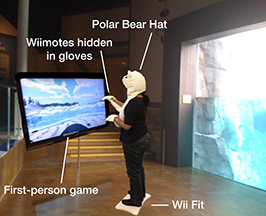A Mile in My Paws: illustrating the magnitude of climate change
The CliZEN partnership is large, and is exploring many parallel avenues for climate change education, but the project that the UIC LTG group has been working most closely on is an embodied interaction game, A Mile in My Paws.

Despite an ever-accelerating rate of global climate change, a recent Pew Research study shows that just between April 2008 and October 2009, the number of people who say that there is solid evidence that temperatures are rising declined from 71% to 57%, and even among those who believe that it does occur, there is a 9% decline in those who believe that it is a serious problem. The standard approach of communicating research results and scientific consensus is not persuading the general public of the existence of this phenomenon or of its severity. There are many possible reasons for this - some rooted in how our own physical experiences of the world shape how we reason about it. A report issued by the American Psychological Association on the psychological dimensions of climate change found that climate change understanding is directly tied to the difficulty humans have in detecting long term statistical trends: we are far more likely to have our judgments influenced by personal experiences with a recent snowstorm (weather) than by charts of temperature change (climate). In a sense, the proprioceptive systems of our bodies are working against us, by lending primacy to data collected through our senses over data collected through abstract communication channels like the news. Similarly, the degree of concern regarding climate change can be “short-circuited” by our autonomic wiring: our perceptions of risk are much more strongly driven by associative and affect-driven responses than by analytic processes. Our research group thus reasoned that we should “fight fire with fire” by producing an educational experience that deliberately enlists proprioception.
To viscerally illustrate the severity and pace of climate change, we have designed an embodied interaction game where users role play as polar bears attempting to cross a stretch of the HUdson Bay. To swim, users windmill their arms while wearing gloves containing Wiimotes, and to run across ice, they shift their weight on a Wii Fit balance board. The users play the game across different decades of climate change, from 1970 when the Bay would still be largely frozen over (thus requiring less effort to cross) to the present day, when climate change has caused early melting of the sea ice, forcing bears to swim (a far more effortful mode of locomotion). By aligning the perceived effort with the measured changes in climate over time, we hypothesize that users of this game will be able to better judge the magnitude of climate change. Moreover, by asking users to role-play as bears, we hypothesize that we may be able to impact users' affective opinions regarding the import of climate change. Situating this game in our partner zoos allows us to reach a wide cross-section of the public.